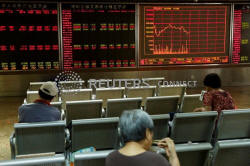Markets find a floor as Chinese data soothe nerves
 Send a link to a friend
Send a link to a friend
 [August 08, 2019] By
Tommy Wilkes [August 08, 2019] By
Tommy Wilkes
LONDON (Reuters) - Stock markets enjoyed a
tentative recovery on Thursday after better-than-expected Chinese export
data, while a steadying of the yuan restored some calm to global markets
following a stormy few days that sent investors scrambling for safety.
Investors were encouraged by data showing Chinese exports rose 3.3% in
July from a year earlier, beating an expected decline of 2%. Chinese
imports fell by less than forecast, despite the Sino-U.S. tariff
struggle.
Markets went into a tailspin on Monday after China let its currency
weaken beyond 7 yuan per dollar, a surprise move that investors took as
retaliation for U.S. President Donald Trump's announcement of more
tariffs on Chinese imports.
Investors fear the trade conflict between the world's two biggest
economies will cause a global recession. Bond markets have flashed red
and a closely watched U.S. recession indicator reached its highest level
since March 2007.

On Thursday, the pan-European Euro STOXX 600 rose 0.94%. Germany's DAX
was up 0.84% and France's CAC 40 1.27%, while Britain's FTSE 100 edged
up 0.2%.
"There's a little bit of calm back in the market at the moment," said
Peter Kinsella, global head of FX strategy at UBP. "But the ball is very
much in Trump's court."
MSCI's world stocks index, which tracks shares in 47 countries, rose
0.22%. It remains down 1.6% for the week and more than 3% since the
start of August.
E-Mini futures for the S&P 500 gained 0.22%, pointing to a stronger open
on Wall Street.
RECESSION FEARS
Investors ran for the safety of bonds this week as fears of a recession
jumped.
Long-term borrowing rates hit their lowest ever -- the aggregate yield
on a Bloomberg-Barclays index of seven- to 10-year bonds worldwide
dropped to a record 1.44% on Wednesday.
(GRAPHIC - Global borrowing rates slide: https://tmsnrt.rs/2MQjRSj)
Yields on U.S. 30-year bonds fell as low as 2.123% overnight, not far
from a record low of 2.089% set in 2016. Ten-year yields dropped further
below three-month rates, an inversion that has reliably predicted
recessions in the past. [US/]
The Philippines became the latest country to cut interest rates,
following aggressive moves by central banks in New Zealand, India and
Thailand that had surprised markets on Wednesday..
"Financial markets are raising risks of recession," said JPMorgan
economist Joseph Lupton. He said the "alarm bell" was loudest in the
government bond market.

[to top of second column] |

People sit in front of a board showing market information at a
securities brokerage house in Beijing, China August 5, 2019.
REUTERS/Thomas Peter

Markets have ramped up their expectations for more easing by the U.S. Federal
Reserve, but the question remains how fast Fed policymakers will move.
Futures <0#FF:> moved to price in a 100% probability of a Fed cut in September
and a near 24% chance of a half-point cut. Some 75 basis points of easing is
implied by January, with rates ultimately reaching 1%.
European and U.S. government bond yields rose on Thursday, with German and
French 10-year yields up from record lows after a rally in recent sessions.
The 10-year U.S. Treasury yield rose to 1.7275% from as low as 1.595% on
Wednesday.
Few investors think the United States and China will be able to resolve their
trade row any time soon and many are bracing for another confrontation.
"This most recent escalation in the U.S.-China trade clash has increased the
risk of a complete fallout in the negotiations considerably," said Vasileios
Gkionakis, a strategist at Lombard Odier, adding that the probability of a "deal
breakdown" had increased to 40% from 25% previously.
Gold has surged this week as investors scrambled to find somewhere safe to park
their cash, rising above $1,500 for the first time since 2013.
Spot gold was last at $1,495 per ounce, down from as much as $1,510 on
Wednesday. Gold is up 16% since May. [GOL/]

In foreign exchange markets, the Japanese yen rose again, gaining 0.2% to 106.08
yen per dollar, although it remains off its weekly high of 105.5 hit on Tuesday.
The yen tends to gain at times of uncertainty, and its rise this week underlined
investors' fears.
China's yuan also gained. In the offshore market it rose 0.2% to 7.0735 yuan per
dollar after touching 7.14 yuan on Tuesday.
The dollar was steady, trading at $1.1196 against the euro.
Oil prices regained some ground on expectations that falling prices could lead
to production cuts. [O/R]
Brent crude climbed 0.7% to $57.48, which followed steep losses on Wednesday.
U.S. crude rallied 1.9% to $52.08 a barrel.
(Additional reporting by Dhara Ranasinghe in London and Wayne Cole in Sydney;
Editing by Larry King and Catherine Evans)
[© 2019 Thomson Reuters. All rights
reserved.] Copyright 2019 Reuters. All rights reserved. This material may not be published,
broadcast, rewritten or redistributed.
Thompson Reuters is solely responsible for this content. |